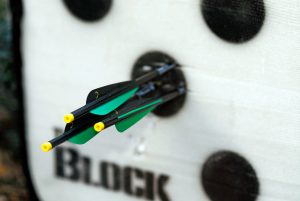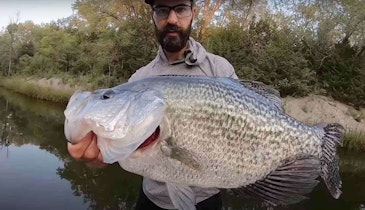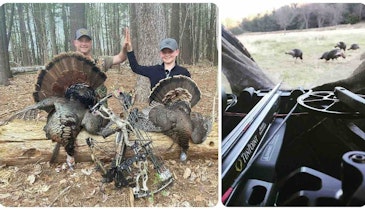There’s little doubt that proper handling in the field can improve the taste of meat. Most hunters know this and are careful to properly care for downed game, quickly field dressing and cooling the meat to ensure better flavor.
But is it possible that your shooting ability can impact the taste of the wild game you harvest?
Science says it can. The livestock industry has known since the 1970’s that animals experiencing stress prior to slaughter undergo metabolic reactions. These reactions can reduce the quality and taste of meat. The same principles apply to wild game killed in the field.

Hunters need to make every attempt to put an animal down as fast as possible, and that requires accurate shooting and proper shot placement. (Credit: John Hafner)
Technically speaking, short-term, acute stress just prior to death results in lactic acid production as glycogen is broken down by the body. This results in lower pH and possibly tougher meat. The more stressed an animal is at the time of death and the length of that stress can actually taint the taste of meat. So the flavor of your wild game may be altered before the animal even goes down. This also explains why two animals of the same age harvested in the same area can taste very different.
As hunters we strive to produce quick, clean kills on all of our game, primarily because true hunters respect the animal and want to minimize suffering. But there’s little question that a poor shot also lessens the quality of meat. For that reason, hunters need to make every attempt to put an animal down as fast as possible, and that requires accurate shooting and proper shot placement.
Quick Tips: Accurate Shooting and Proper Shot Placement
Instant Kill. The most effective shots for the reduction of lactic acid production are those that kill the animal instantly, usually to the central nervous system.
Heart and Lung Shots. Barring that, heart shots are probably the next best option since the animal will die quickly without producing much lactic acid. Lung shots will also result in a quick death.
Bullet Construction. Aside from shot placement, bullet construction is also another important consideration. To dispatch an animal quickly, you need to select a bullet that expands properly. It’s hard to imagine that the bullet you choose for your hunting rifle may have an effect on the taste of recovered game, but it’s true.
If you’re a serious meat hunter and you want to fill the freezer with high-quality protein, it’s essential to do your part to end the animal’s suffering as quickly as possible. And that means good shooting. It’s yet another reason to spend time practicing at the range this year, to know the limitations of your weapon (and yourself) and to only take shots that will result in a quick, clean kill.
Featured image: John Hafner






